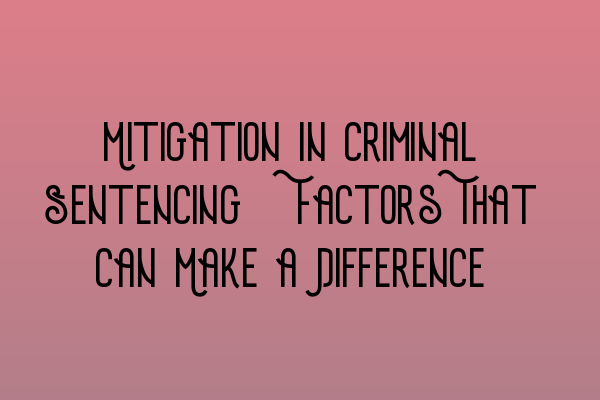Mitigation in Criminal Sentencing: Factors That Can Make a Difference
When it comes to criminal sentencing, the role of mitigation cannot be understated. Mitigation refers to the process of presenting evidence or arguments to the court that may reduce the severity of the sentence imposed on a defendant. It offers an opportunity for the defendant to demonstrate remorse, acknowledge responsibility, and present any relevant personal circumstances or factors that may have contributed to the offense.
Understanding the concept of mitigation is crucial for both criminal defense lawyers and defendants. By strategically presenting persuasive mitigating factors, one may be able to secure a more favorable outcome in terms of sentencing. In this article, we will explore some key factors to consider during the mitigation process.
Prior Good Character
A strong argument for mitigation can be made if the defendant has a previously unblemished character. Evidence of good character, such as testimonials from friends, family, or colleagues, can be presented to the court. This can demonstrate that the offense is out of character and the defendant’s actions were an aberration rather than a true reflection of their character.
It is important to note that the testimonials should be genuine and relevant to the offense. Testimonials that highlight the defendant’s positive contributions to society, previous law-abiding behavior, or charitable acts may hold significant weight in persuading the court to impose a more lenient sentence.
Remorse and Rehabilitation
Expressing genuine remorse and demonstrating efforts towards rehabilitation can be powerful mitigating factors. When presenting a case for mitigation, it is essential to show that the defendant understands the consequences of their actions and has taken steps to change their behavior or seek support to address any underlying issues that may have contributed to the offense.
Supporting evidence, such as completion of counseling programs, participation in community service, or enrollment in educational or vocational courses, can help showcase the defendant’s commitment to personal growth and rehabilitation.
Cooperation with Authorities
Cooperating with law enforcement or prosecution authorities can also significantly impact the sentencing outcome. If the defendant has provided substantial assistance, such as providing information leading to the arrest or conviction of other individuals involved in criminal activities, their cooperation can be considered a mitigating factor.
It is crucial to consult with legal professionals to assess the potential benefits and risks associated with cooperation before making any decisions. However, if cooperation is deemed appropriate, it can enhance the chances of receiving a more favorable sentence.
Personal Circumstances
Personal circumstances can play a crucial role in mitigation. Factors such as age, health, family responsibilities, or financial hardship may be relevant in determining the appropriate sentence. The court may consider these circumstances when evaluating the defendant’s culpability, the likelihood of reoffending, and the impact of the sentence on their future prospects.
It is important to provide supporting evidence, such as medical records, financial statements, or affidavits, to substantiate claims related to personal circumstances. An experienced criminal defense lawyer can help identify and present the most compelling evidence to support the mitigation case.
Remember, each case is unique, and the weight given to mitigating factors may vary depending on the nature and seriousness of the offense, as well as the individual circumstances of the defendant. Therefore, it is essential to consult with a qualified legal professional who specializes in criminal law to ensure the best possible outcome.
For more information about the SQE Criminal Law & Practice Law in the UK, you may find the following articles helpful:
